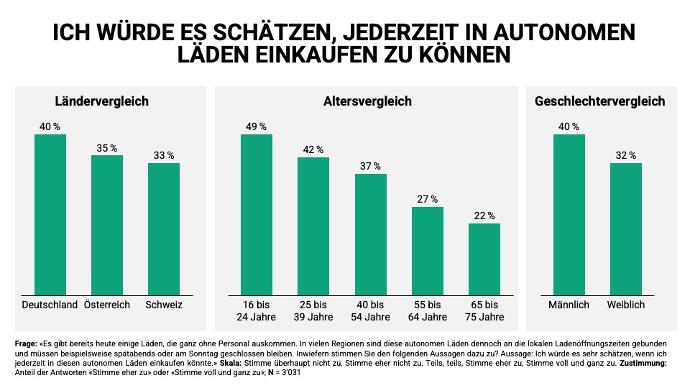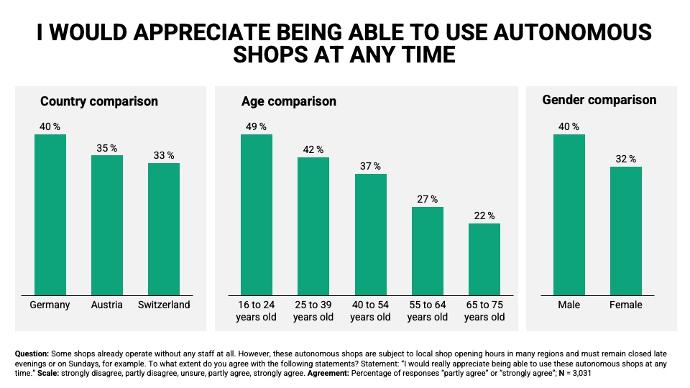Self-service shops allow customers to shop 24/7 without having to rely on staff. This provides optimal flexibility for customers and lower operating costs for retailers - a seemingly perfect win-win situation. Yet opinions on this concept are divided. Supporters see self-service shops as an up-to-date response to the needs of modern society, which values flexible shopping options. Critics though warn of the risks: a threat to traditional retailers, job losses and the gradual erosion of social norms, such as a day of rest on Sunday.
Legal grey area
The legal situation over self-service shops is currently unclear. There are only a few of these shops in Switzerland. The legal regulations vary depending on the canton and type of shop, and are often related to regular opening hours.
Until a clear legal framework is established, the situation for operators will remain uncertain. One example is the container shop at Pilatusplatz in Lucerne, which opened in 2023. Despite being a test laboratory for new sales approaches and the fact that it could in theory open 24/7 as a shop without sales staff, it must comply with stipulated shop opening hours.
There are legal hurdles in Germany too. The Migros Zurich subsidiary Tegut experimented with staff-free mini-markets, known as ‘Teo-Automaten’. However, at the start of this year, a court in Hesse ruled that these mini-markets cannot operate on Sundays or public holidays as they violate shop opening hours legislation.
Surprising customer views
How important is being able to use self-service shops at any time for customers? And should these shops have to meet the same regulations as normal shops? We asked around 3,000 people in Germany, Austria and Switzerland these questions as part of our forthcoming GDI study on AI in retail. The initial partial analyses provide some surprising results.
Majority accept regular opening hours
70% of respondents believe to some extent that the opening hours for normal shops should also apply to self-service ones. Only 30% believe the current regulations are outdated. Overall, acceptance of self-service shops is quite low: just a third (36 %) of respondents would welcome the opportunity for self-service shopping 24/7. However, this preference varies significantly depending on the country, age and gender.
 |
 |
Germany is more open
In Germany, 40 % of respondents would welcome the opportunity to use self-service shops 24/7. In Switzerland and Austria, support is significantly lower at 35 % and 33 % respectively.
“We were very surprised by the striking differences between the countries,” explains Johannes Bauer, the study director and Head of the GDI think-tank. “Openness to self-service shops is a fifth higher in Germany than in Switzerland. We will continue to analyse the factors behind this difference. One reason might be that retail staff enjoy a higher status in Switzerland.”
Generation Z predominates
Gen Z (16 to 24 year-olds) shows the greatest willingness to use self-service shops at 49 %, followed by 25 to 39-year-olds at 42 %. For people aged 40 to 54, the figure stands at 37 %, while it is significantly lower amongst those aged 55 to 64 and 65 to 75 (27 % and 22 % respectively). At 40 %, men show stronger support for 24/7 shopping than women at 32 %.
“These clear age-related differences are consistent with the findings of our study “Going Shopping is Dead: How to Restore Meaning and Fun in Retail,” explains Gianluca Scheidegger, co-author of the study and senior researcher at the GDI. The younger generation in particular often suffer from time-related stress, which influences their preference for fast and time-independent shopping - especially amongst people aged 25 to 39 who are under great pressure due to career and family commitments. “However, we were surprised by the low level of acceptance overall for this new shopping concept.”
Exclusive pre-publication at the GDI retail conference
We will present the detailed analysis of our survey and further insights from the study on AI in retail, which will be published at the beginning of 2025, exclusively on 12 September at the 74th International Retail Summit.